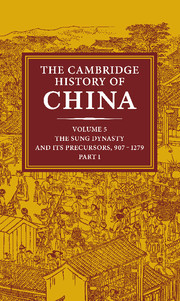Book contents
- Frontmatter
- Introduction: the Sung Dynasty and Its Precursors, 907–1279
- 1 The Five Dynasties
- 2 The Southern Kingdoms between the T’ang and the Sung, 907–979
- 3 Founding and Consolidation of the Sung Dynasty under T’ai-tsu (960–976), T’ai-tsung (976–997), and Chen-tsung (997–1022)
- 4 The Reigns of Jen-tsung (1022–1063) and Ying-tsung (1063–1067)
- 5 Shen-tsung’s Reign and the New Policies of Wang An-shih, 1067–1085
- 6 Che-tsung’s Reign (1085–1100) and the Age of Faction
- 7 The Reigns of Hui-tsung (1100–1126) and Ch’in-tsung (1126–1127) and the Fall of the Northern Sung
- 8 The Move to the South and the Reign of Kao-tsung (1127–1162)
- 9 The Reign of Hsiao-tsung (1162–1189)
- 10 The Reigns of Kuang-tsung (1189–1194) and Ning-tsung (1194–1224)
- 11 The Reign of Li-tsung (1224–1264)
- 12 The Reign of Tu-tsung (1264–1274) and His Successors to 1279
- Bibliography
- Glossary–Index
- References
5 - Shen-tsung’s Reign and the New Policies of Wang An-shih, 1067–1085
Published online by Cambridge University Press: 28 March 2010
- Frontmatter
- Introduction: the Sung Dynasty and Its Precursors, 907–1279
- 1 The Five Dynasties
- 2 The Southern Kingdoms between the T’ang and the Sung, 907–979
- 3 Founding and Consolidation of the Sung Dynasty under T’ai-tsu (960–976), T’ai-tsung (976–997), and Chen-tsung (997–1022)
- 4 The Reigns of Jen-tsung (1022–1063) and Ying-tsung (1063–1067)
- 5 Shen-tsung’s Reign and the New Policies of Wang An-shih, 1067–1085
- 6 Che-tsung’s Reign (1085–1100) and the Age of Faction
- 7 The Reigns of Hui-tsung (1100–1126) and Ch’in-tsung (1126–1127) and the Fall of the Northern Sung
- 8 The Move to the South and the Reign of Kao-tsung (1127–1162)
- 9 The Reign of Hsiao-tsung (1162–1189)
- 10 The Reigns of Kuang-tsung (1189–1194) and Ning-tsung (1194–1224)
- 11 The Reign of Li-tsung (1224–1264)
- 12 The Reign of Tu-tsung (1264–1274) and His Successors to 1279
- Bibliography
- Glossary–Index
- References
Summary
Shen-tsung’s Ascension and the Crisis of the Mid-eleventh Century
The nature of the midcentury crisis
In 1067 the nineteen-year-old Chao Hsü (1048–85) ascended the throne with an acute sense of shame for his country’s foreign humiliations and a fierce ambition to redress the crises that beset his empire. The young Shen-tsung emperor and his ministers had many reasons to feel uncertain, for the death of his father, Ying-tsung (r. 1063–7), after only three and a half years on the throne could be taken only as a bad omen. But the sense of crisis that pervaded Shen-tsung’s empire had been brewing throughout Jen-tsung’s reign (1022–63), ever since the Sino-Tangut war of 1038–44 had exposed troubling weaknesses in the fundamental pillars of the dynastic system itself – the military, the financial system, and the bureaucracy.
The four-year war with the Tangut Hsi Hsia had demonstrated that the Sung’s mercenary armies were unfit for active combat. Although the Sung mustered some 1.25 million men against 826,000 Tangut troops, the aged and inexperienced Sung soldiers, hired from among the flotsam of the marketplace, were likely to scatter at their first sight of a Tangut soldier. The war confirmed the status of the Tangut state as a major Asian power, even as the cessation of hostilities exacerbated defensive pressures on the Sung as just one of several players in a multistate geopolitical setting. With the Tanguts solidly entrenched in the Ordos, and the Khitan Liao sitting implacably along the northern borders of Ho-tung and Ho-pei, Sung ministers saw little short-term alternative to maintaining their huge if unreliable standing armies in the north.
- Type
- Chapter
- Information
- The Cambridge History of China , pp. 347 - 483Publisher: Cambridge University PressPrint publication year: 2009
References
- 13
- Cited by

